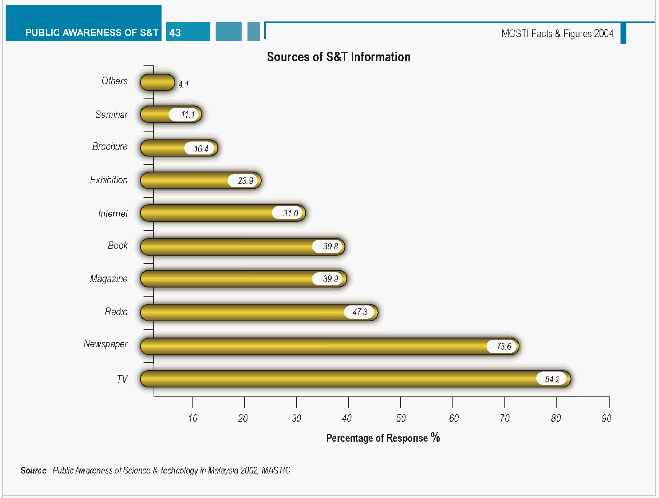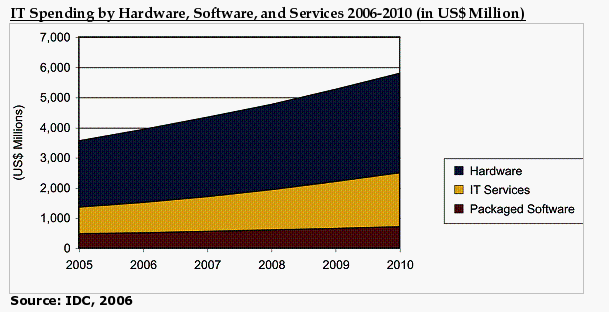Networked Society
"Science, Technology and Innovation for knowledge generation, wealth creation and societal well-being" - Vision Statement of the Ministry of Science, Technology and Innovation, Malaysia.
Since 1973, the government of Malaysia has recognized the contribution that science and technology could make to its country. Known as one of the eight East Asian miracle economies for outstanding growth in the late 1980s and 1990s, Malaysia has benefited from a combination of fundamentally sound development policies, tailored interventions, and an unusually rapid accumulation of physical and human capital. Additionally, the country has been unusually successful at sharing the fruits of growth, showing declining inequality. As a result of the rapid, shared growth, human welfare has improved dramatically. Life expectancy in Malaysia has increased from 56 years in 1960 to 73 years today.
Malaysia, ranked 26th overall in the World Economic Forum's Global Competitiveness Report (2007), has one of the most efficient economies in the region with flexible labor markets, relatively undistorted goods markets and public institutions which in many areas (e.g., rule of law, the legal system) are already operating at the level of the top performing new EU members.
People and Organizations Online are important indicators of readiness for the networked world. Malaysia ranks 23rd among the 222 countries for which statistics exist in the CIA's World Factbook for internet users, and 50th in the number of internet hosts. Organizations have seen the value of this audience and most have an internet presence. A quick search of Malaysia Society and Culture website listing on Yahoo! show over 300 sites, and over 2000 sites listed for Business and Economy.
Malaysia:
Digital Access Index (2003): 0.57; (44 of 178)
Fixed telephone subscribers per 100 inhabitants: 19.3
Mobile cellular subscribers per 100 inhabitants: 37.7
Internet access tariff as % of Gross National Income (GNI) per capita: 2.9
Adult literacy: 87.9%
Combined primary, secondary and tertiary school enrolment level: 72%
International Internet bandwidth per capita: 53.8 (kbit/s)
Broadband subscribers per 100 inhabitants: 0.1
Internet users per 100 inhabitants: 32 Malaysia:
Locally relevant content demonstrates a propensity towards English as the primary language of the web, but several sites are multi-lingual, as mixtures of languages are spoken in Malaysia.Languages: Bahasa Melayu (official), English, Chinese dialects (Cantonese, Mandarin, Hokkien, Hakka, Hainan, Foochow), Tamil, Telugu, Malayalam, Panjabi, Thai; note - in addition, in East Malaysia several indigenous languages are spoken, the largest are Iban and Kadazan
Information and communication technologies in everyday life are demonstrated by the number of Personal Computers in use in Malaysia; over 20% of the population has a personal computer. Evidence of use of ICTs in everyday life are shown by a new promotion by CIMB bank, which hopes to increase to 800,000 the number of customers (which currently stands at 720,000) using Internet banking. CIMB Clicks was the second most popular Net banking website in Malaysia according to a survey by Comscore, a global Internet information provider. CIMB Clicks users can use the facility to pay utility bills, town council fees, credit cards, apply for initial public offerings, transfer funds and make account enquiries.
Malaysians have a generally positive attitude towards ICT and strongly believe in the promise and benefits of science and technology, as indicated by the index of scientific promise of 71.9%, and have less reservations of science and technology (as indicated by their index of reservation of 46.8%) compared to the Europeans (53.5%).
Television has been the most popular source of information for Malaysians, followed closely by newspapers, the radio, and magazines. Malaysians relied least on the internet. The findings suggest that we need to capitalize on using the various media to increase public awareness of science and technology. We also need to increase the public's awareness of the Internet's potential as a trustworthy source of information on science and technology.
Information and communication technologies in the workplace are also an important measure of a countryss readiness. The following graph from IDC shows a significant acceleration of spending on ICT in Malaysia based on their projections.
"THE Best of All Worlds" is a tagline unique to Malaysia which could be used to brand the nation as a major global hub for shared services and outsourcing (SSO) activities. The country has first-class infrastructure, a competitive cost structure, conducive business environment, strong government support, an English-speaking workforce and, more importantly, political stability. All these strengths need to be significantly highlighted to raise awareness of the country in the international markets.
Furthermore, the Government has identified niche areas such as creative multimedia, Pan-Asian services (for example, multi-language and contact center support), business continuity, and specific sectors like energy, finance, logistics and high technology for development. SSO encompasses both outsourcing and off shoring activities. Shared services comprise an arrangement where common services are provided by a single organization leveraging on economies of scale, such as outsourcing and call-centre consolidation.
AT Kearney, in its 2004 report, ranked Malaysia third in SSO. It observed that "Malaysia is often overlooked, but a natural choice for offshore services."
A Deloitte survey on "The Asian Advantage in the Outsourcing Revolution (2005)" also ranked Malaysia second in supply chain management, third in information technology support and fourth in analytics. It further places Malaysia as an emerging contender to be reckoned with. It acknowledged that the country draws much advantage from the Multimedia Super Corridor (MSC), which is attracting the SSO industry into Malaysia.
To date, 48 companies involved in SSO have been given MSC status, accounting for 12,000 or 40 per cent of jobs in the MSC. At the end of last year, revenue of these companies was RM2.04 billion.
The number of companies is also expected to grow, especially with the presence of big players which have set up business process outsourcing (BPOs) in Malaysia, such as DHL, IBM, HSBC , Standard Chartered Bank, Shell, Motorola and Nippon Telegraph and Telephone Corp.
HSBC alone created some 2,000 jobs in processing and customer service activities last year for its group of companies, including those in Australia, New Zealand, Singapore, the UK and the US.
Shell also made Malaysia its hub for its global information technology support centre with a staff strength of 1,000 personnel, of whom about 90 per cent are Malaysian.
Moving forward, the country is progressing into the new wave, Knowledge Process Outsourcing (KPO), which entails business management and integration as well as business transformation requiring highly-skilled human resources in dealing with a more complex and demanding environment.1

